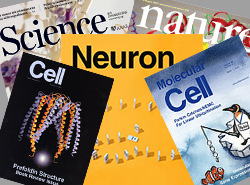Publication of IMPRS-LS student Juliane Jäpel

Jaepel, J., Hubener, M., Bonhoeffer, T., and Rose, T.
Nat Neurosci, 2017, 20, 1708-1714.
doi: 10.1038/s41593-017-0021-0
Lateral geniculate neurons projecting to primary visual cortex show ocular dominance plasticity in adult mice.
Experience-dependent plasticity in the mature visual system is widely considered to be cortical. Using chronic two-photon Ca2+ imaging of thalamic afferents in layer 1 of binocular visual cortex, we provide evidence against this tenet: the respective dorsal lateral geniculate nucleus (dLGN) cells showed pronounced ocular dominance (OD) shifts after monocular deprivation in adult mice. Most (86%), but not all, of dLGN cell boutons were monocular during normal visual experience. Following deprivation, initially deprived-eye-dominated boutons reduced or lost their visual responsiveness to that eye and frequently became responsive to the non-deprived eye. This cannot be explained by eye-specific cortical changes propagating to dLGN via cortico-thalamic feedback because the shift in dLGN responses was largely resistant to cortical inactivation using the GABAA receptor agonist muscimol. Our data suggest that OD shifts observed in the binocular visual cortex of adult mice may at least partially reflect plasticity of eye-specific inputs onto dLGN neurons.
